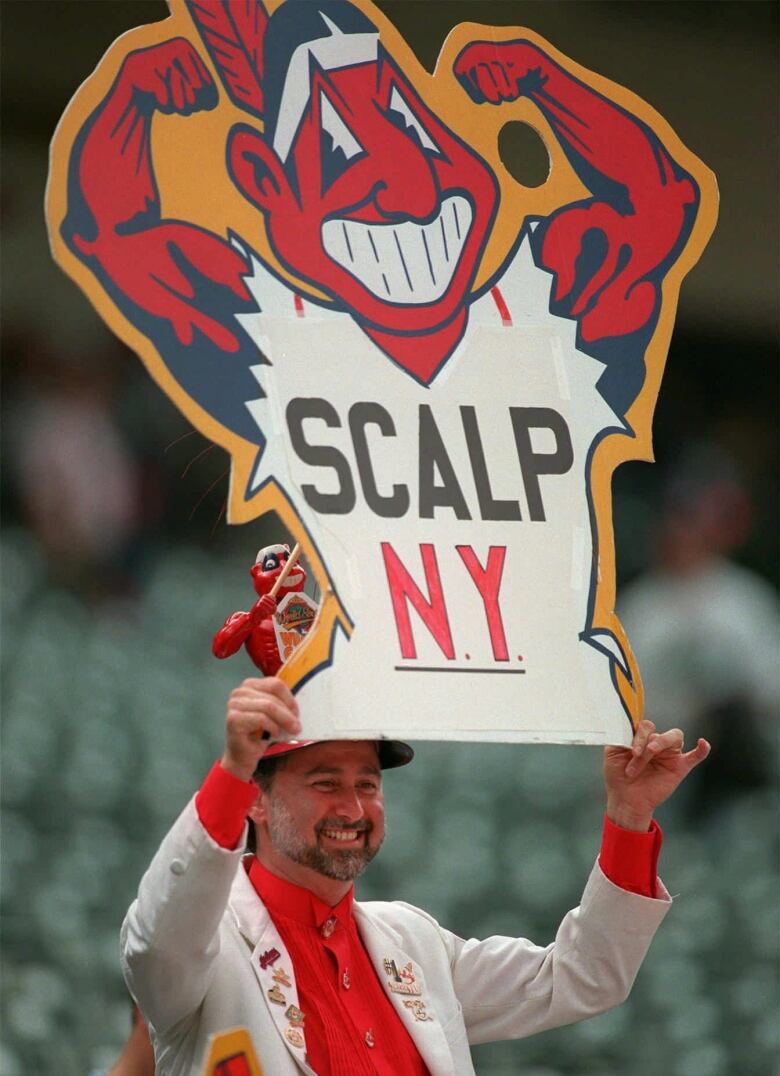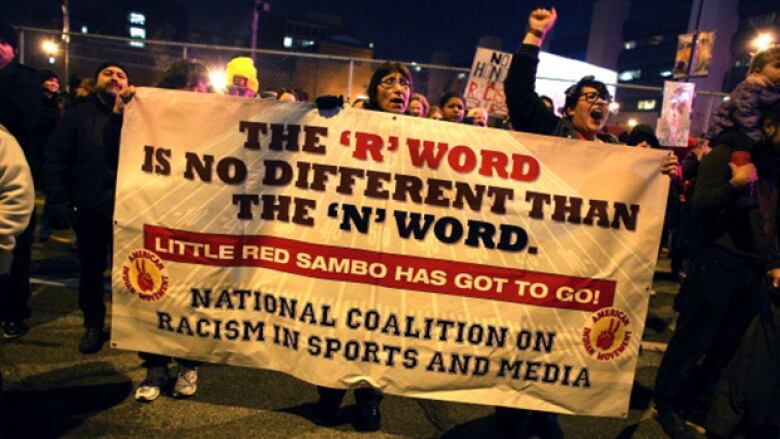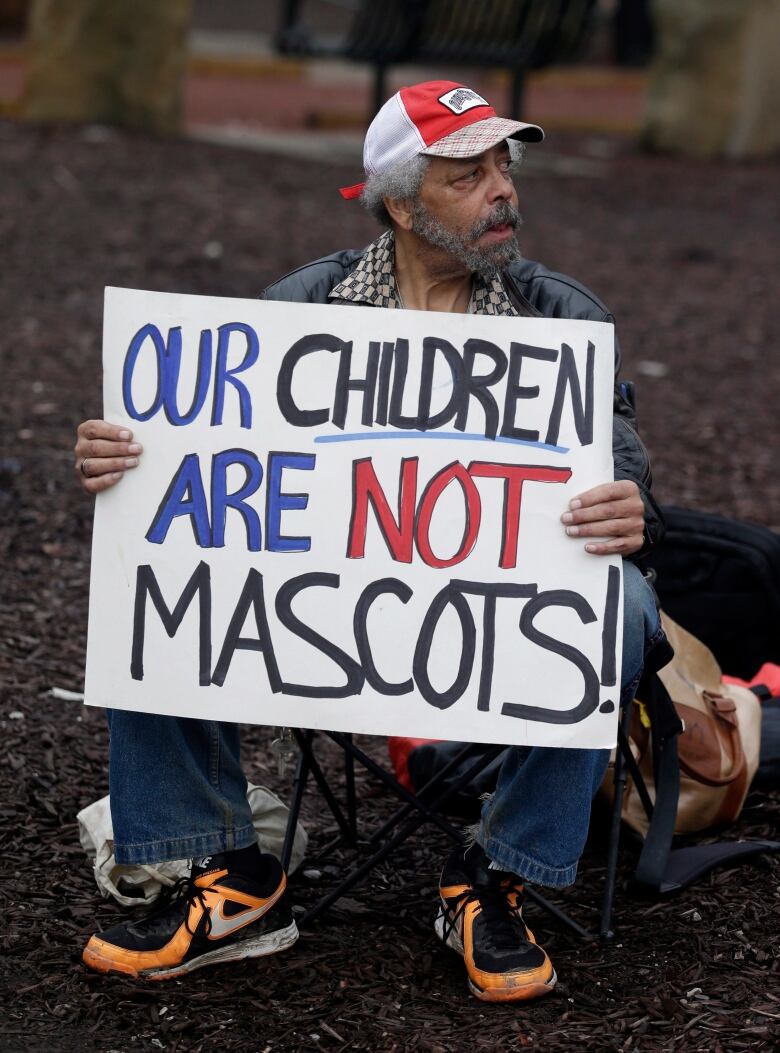Indigenous critic Jesse Wente: 'We are not your mascots, we are human beings'
Pop culture critic responds to recent Toronto Star piece on indigenous imagery in sports
CBC Radio pop culture critic Jesse Wentespoke out Tuesday morningagainst the use of indigenous names and symbols bysports teams, in response to a recent story in the Toronto Star.
The story,by Star columnist Rosie DiManno,followed efforts by agroup ofOntario school board officials known as the Equity Summit Groupto ban schoolchildrenfrom wearing clothingthat bears "pejorative indigenous names, logos and mascots."
- Redskins controversy: Protesters ramp up pressure
- Cleveland 'Caucasians' shirt becomes a hit on native reserves
DiMannocriticized such effortsin Ontario and elsewhere by "professional taste inquisitors" to scrubsuch imagery from the sports world.
Wente, who is aboriginal,shared his thoughts during an interview with Metro Morning host Matt Galloway.
He saidDiMannodeclined an offer to appear on the program, and that the Toronto Star did not respond to his tweets.
A transcript of that interview follows:
Matt Galloway: Your reaction, please, when you read Rosie DiManno's column last week.
I wanted to say surprise, Matt. I wish that was actually truthful.But to be really honest, Ithink I'm sort of beyond being surprised anymore about these things. I am a bit amazed the indigenous sports mascot issue is still an issue, let alone the dialogue around it, that it is still an issue in 2016. But again, I don't think ultimately that's the reaction. I think my real reaction was frustration.

I was also very frustrated with the media. I've been privileged this is my 20th year with the CBC and I've spent much of that time on the air here on this very show and I've generally found this to be very supportive of me and indigenous voices in general.
But the reality is, in the Canadian media, it is not a diverse space, particularly when it comes to columnists. There aren't very many diverse voices that get a space of a column in a paper such as the Toronto Star.
And like issues, we were talking about last week around things like the Oscars, I mean, those are just a symptom of a much larger systemic issue around diversity and inclusion that I think the larger culture is struggling with. And I think columns like this are also indicative of that.
So I think frustration was, ultimately, the emotion
So let's respond directly to the piece. Why do you think we,as a society, need to do away with indigenous mascots and logos?
I realize what I'm now going to say in terms of the column is diluting a word, but it's because I do think indigenous logos are racist, because they're a byproduct ultimately of colonialism. That they're ever even championed as honorific is a symbol of colonial violence.
Listen, sports mascots themselves are not the reason my community continues to suffer with things like clean water, or lack of it, poverty, suicide, mass incarceration they are all byproducts of the same sort of colonial culture that is responsible for these sorts of things. DiManno says in her column that we're all allowed to borrow because no one owns history, and I fundamentally disagree with this argument.
Why?
Because to me, indigenous sports mascots are an exemplar of history being owned. And it's only privilege that actually denies that not political correctness, not censorship. She defends the local team named the Mississauga Mohawks by saying that "Mississauga" is an Anishinaabe word which is true,I will agree with her on that but of course missing the fact that Mohawks are Haudenosaunee.And thus, even the idea of "Mississauga Mohawks" is a colonial idea, conflating two very different groups of people.
I think we can, as indigenous people, say why we find insult in these names. It's very colonial in its approach.
We don't even have to get to more obvious examples like the [Washington] Redskins which is a name so blatantly offensive in its construction, it's amazing it still persists today or the Cleveland Indians and their Chief Wahoo caricature.
Atlanta Braves, the "tomahawk chop "
The Atlanta Braves and all teams by the way, Matt, and I'm a longtime baseball lover, that I turn the channel when they come on.

So you don't buy the argument these names are affectionate or empowering, as she says?
I think they can only be seen as affectionate when you come from a colonial world view. I don't think that is actually how cultures behave with one another when they don't come from, ultimately, a patriarchal and colonial world nature. They're symbols, ultimately, of the oppression and violence that occurred on this land to make indigenous people go away.
And I would point out that when a lot of these names because one of the arguments in the piece is these names have history and a legacy and people are very attached to them.
And it is true,many of these names were designed a hundred or so years ago, a point when it was logical for the people that were making these names to think they'd never have to encounter indigenous resistance to these names, because both governments north and south of the border were actively involved in genocide against indigenous people.

Those are different times. Why is this still an issue now?
I think it's because colonial cultures are terrible at self-realization. We get into very uncomfortable conversations,like the one we're having now, and that discomfort, for the over-culture, is not something that they embrace, particularly here in Canada.
Cynically, I worry that they won't go away because of money; because of media coverage like this, that this sells papers and there's money involved. But I think all of that's true. I think it's also a symptom of where indigenous people fall on the cultural ladder.
But I want to end by saying this, Matt these names and logos, they've always been racist. They were racist when they were conceived. The big difference now is that the marginalized people that these logos depict now have a voice. Thereare now things like the Equity Summit Group to write a letter to say it's wrong. That's what changed.
I'm here, not in the residential schools like my grandmother. I have a voice and I'm telling you what they would tell you, which is, we're notyour mascots, we're human beings.













_(720p).jpg)


 OFFICIAL HD MUSIC VIDEO.jpg)
.jpg)



























































































